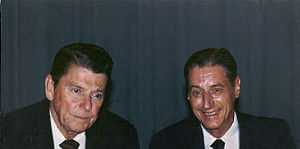Joseph Granville
| Joseph Granville | |
|---|---|
|
Joseph Granville (right side) with Ronald Reagan | |
| Born |
August 20, 1923 United States |
| Died |
September 7, 2013 (aged 90) Kansas City, Missouri |
| Occupation | Writer, analyst |
| Known for | Financial market prediction |
Joseph Ensign Granville (August 20, 1923 – September 7, 2013), often called Joe Granville, was a financial writer [1] and investment speaker. He popularized [2] the use of "on balance volume", a technique of technical analysis that attempts to predict future prices of stocks, commodities, and other financial assets traded on financial markets for which historical price and volume information is available.[3] The use of technical analysis contradicts much of modern scholarship on financial markets.
He published a financial newsletter called The Granville Market Letter from 1963 until shortly before his death in 2013.[4] According to Mark Hulbert, Granville "had a disastrously poor track record."[5]
Granville is probably best known for his bearish market calls during the 1970s, 1980s, and 1990s, when he claimed that the stock market was headed for imminent collapse. Granville was known as a great showman [6] who would emerge from a coffin at an investment conference, or appear to walk across water (at a swimming pool) when meeting clients. According to Robert Shiller in his book Irrational Exuberance[7]
His investment seminars were bizarre extravaganzas, sometimes featuring a trained chimpanzee would could play Granville's theme song "The Bagholder's Blues," on piano. He once showed up at an investment seminar dressed as Moses, wearing a crown and carrying tablets. Granville made extravagant claims about his forecasting ability. He said he could predict earthquakes and once claimed to have predicted six of the past seven major world quakes. He was quoted by TIME Magazine as saying "I don't think that I will ever make a serious mistake in the stock market for the rest of my life," and he predicted that he would win the Nobel Prize in economics.
Shiller states that Granville's market calls were said by major media sources to have caused large moves in the Dow Jones Industrial Average on April 22, 1980 (+4.05%) and on January 6, 1981.
He died at the age of 90 in 2013 at a Kansas City, Missouri hospice, of pneumonia.[8]
Personal life
Granville was married three times. He described his first marriage in 1945 as “a hysterical reaction to war” in The Book of Granville.[4] He had eight children with his second wife, the former concert pianist and musicologist Paulina “Polly” Delp, whom he married in 1950 and became legally separated from in 1972 when most of the children were very young.[4] His eight children with Paulina were Leslie, Blanchard, Leona, Mary Beth, John, Paul, Sara, and Johanna Granville.[4] The couple officially divorced in 1980. Paulina died on October 8, 2012, at 84.[9]
Granville’s third marriage was to Karen Erickson.
References
- ↑ Joseph E. Granville, Granville's New Strategy of Daily Stock Market Timing for Maximum Profit, Prentice-Hall, Inc., 1976. ISBN 0-13-363432-9.
- ↑ Larry Williams, letters to Technical Analysis of Stocks and Commodities magazine, V. 22:3 (10-14), March 2004
- ↑ http://www.moneyshow.com/trading/article/31/TEbiwkly08-31215/A-Candle-Trigger-for-Market-Tops/
- ↑ 4.0 4.1 4.2 4.3 Nikolaj Gammeltoft, Bloomberg, September 9, 2013 Joe Granville, Whose Bearish Calls Moved Stocks, Dies at 90
- ↑ Hulbert, Mark (10 September 2013). "Four lessons Joe Granville taught us". Market Watch. Retrieved 17 February 2015.
- ↑ Iain Jenkins, International Herald Tribune, June 11, 1994 After Initial Splash, Newsletter Gurus Don't Seem to Last Long
- ↑ excerpt at Harvard International Review, Robert Shiller "Exuberant Reporting," Spring 2001.
- ↑ Christopher Drew, "Joseph E. Granville, Stock Market Predictor, Dies at 90", New York Times, September 18, 2013
- ↑ “Obituary for Paulina Delp Granville” Dale Woodward Funeral Homes, October 8, 2012
External links
- Archived version of The Granville Letter's website (now offline)
- On Balance Volume
- Harvard International Review - Exuberant Reporting Media and Misinformation in the Markets
- CNBC Video the day Joe Granville crashed the market with a "Sell everything" recommendation (believed 1981)
- Journal of Portfolio Management Spring 1982
|
